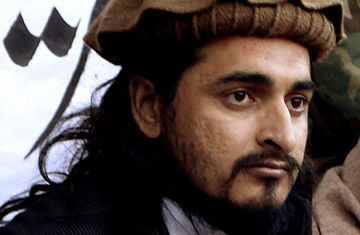
Hakimullah Mehsud has become the leader of Pakistani Taliban faction after death of Baitullah Mehsud.
The Taliban has ravaged Pakistan, but its leadership is in tatters. After weeks of denials, two Pakistani Taliban commanders admitted on Aug. 25 that the group's chief, Baitullah Mehsud, had been killed in an Aug. 5 U.S. missile strike. The commanders also confirmed reports that Hakimullah Mehsud, a regional chieftain close to Baitullah and one of the organization's rising stars, had been tapped to take the top job.
The announcement highlighted the degree to which the Taliban has been decimated by infighting and drone attacks — as well as the degree to which keeping tabs on a group shrouded in secrecy remains a formidable challenge. Pakistani officials had recently issued conflicting reports as to whether Hakimullah was even alive; intelligence sources suggested he had been killed in a shootout during a Taliban meeting convened to decide on Baitullah's successor. Some still suspect that the man calling himself Hakimullah is, in fact, an imposter claiming to be the terror chief in a bid to convince the world that the group's fractious leadership remained intact. Assuming he's alive, though, relatively little is known about the ascendant young leader, who is a member of the same tribe as his predecessor Baitullah but is not thought to be a close relative. Still, reports suggest that Pakistan and its ally the U.S. may have rid themselves of one problem only to gain another.
Fast Facts:
• Believed to be 28 years old.
• According to the BBC, "Hakimullah" is a nom de guerre; the militant's real first name is said to be Zulfiqar.
• Born into the Mehsud tribe in South Waziristan. Attended a village madrassa in Hangu district but left before completing his studies.
• Described as fiery, hotheaded and charismatic. So far has appeared willing to pose for photographs — unlike his predecessor, of whom few known pictures exist.
• Rose to assume command over the Khyber, Kurram and Orakzai tribal regions in Northwest Pakistan, where he moved to implement a stricter version of Islamic law.
• Once served as Baitullah Mehsud's driver. Was appointed the Taliban commander's chief spokesman in Oct. 2007
• In Nov. 2008, convened a meeting with Western journalists at an undisclosed location in Orakzai, at which he assailed Pakistan’s President, Asif Ali Zardari, for kowtowing to U.S. interests. The meeting, during which he posed next to a U.S. Humvee stolen from a military convoy, cemented his reputation as a rising star within the Taliban.
• Has up to 8,000 men under his direct command. Is believed to be in charge of recruiting and training suicide bombers.
• Was behind a series of attacks on US and NATO military-cargo vehicles destined for Afghanistan. Claimed responsibility for the June 9 bombing of the Pearl Continental hotel in Peshawar, which killed at least 15, as well as an attack on the Sri Lankan cricket team in Lahore earlier this year.
• Has a 10 million rupee ($120,000) bounty on his head, courtesy of the Pakistani government.
• Unanimously selected as leader by a 42-member shura council during a meeting held in South Waziristan, according to another Taliban commander.
Quotes about:
"Despite his pleasant demeanor and cheeky smile, danger radiated from the
man."
—From an Aug. 25, 2009 BBC profile in which the author recalled
meeting Mehsud in Oct. 2007.
"It is a consensus among all Taliban that Hakimullah Mehsud is the best
choice."
—Sher Zamin, an aide to Taliban commander Maulvi Faqir
Mohammad, on Mehsud's selection as the new Taliban chief. (AP, Aug.
22, 2009)
"[A] brash young commander with a reputation for pitiless violence."
—New York Times, Aug. 25, 2009.
"He has the same personality traits. He will pull out a gun and kill his
own people."
—Rehman Malik, Pakistan's interior minister, comparing
Hakimullah to Ugandan dictator Idi Amin. (New York Times, Aug. 23,
2009)
Quotes by:
"We will take revenge and soon."
—Vowing to retaliate for the U.S. drone attack that killed Baitullah
Mehsud. (AFP, Aug. 24, 2009)
